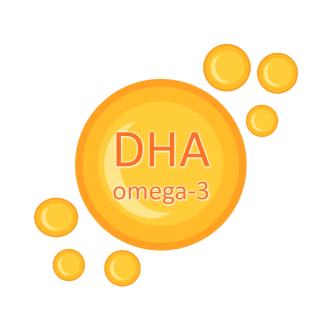
Docosahexaenoic acid (DHA) is an essential fatty acid, which means it is necessary for proper body function but cannot be synthesized by the body and must be obtained through dietary sources or supplements. DHA is one of the important omega-3 fatty acids.
The richest dietary sources of DHA include:
- Fish Oil: Fatty fish such as salmon, mackerel, sardines, tuna, and trout are excellent sources of DHA.
- Algae: DHA originates in the food chain from algae. Fish absorb DHA from algae, so algae or algal oil can be an excellent vegetarian source of DHA.
- Seafood: Crabs, lobsters, shrimp, and other seafood also contain some DHA.
- Supplements: If you don't consume enough fish or algae, you can consider DHA supplements. Various dietary supplements with omega-3 fatty acids, including DHA, are available.
Ensuring an adequate intake of DHA in your diet is important for maintaining the health of your brain, heart, eyes, and other bodily functions. Therefore, it is advisable to include DHA-rich foods in your diet or consult a healthcare professional about the use of supplements if needed.
Why is DHA (docosahexaenoic acid) so important for the body?
Docosahexaenoic acid (DHA) is a vital omega-3 fatty acid that plays a crucial role in the human body for several reasons. Here are some of the key reasons why DHA is important:
- Brain Health: DHA is a major structural component of the brain, particularly in the cerebral cortex, which is responsible for higher-order cognitive functions. It is essential for the development and maintenance of the nervous system, and it supports optimal cognitive function, memory, and learning.
- Eye Health: DHA is a major component of the retina, where it helps maintain proper vision and eye health. It is particularly important for the development of the infant's visual system.
- Heart Health: DHA, along with another omega-3 fatty acid called EPA (eicosapentaenoic acid), is known for its cardiovascular benefits. It helps reduce inflammation, lowers triglyceride levels, and can improve heart health by reducing the risk of heart disease.
- Inflammation: DHA has anti-inflammatory properties and can help regulate inflammation in the body. Chronic inflammation is associated with various diseases, and DHA may help mitigate these risks.
- Pregnancy and Infant Development: DHA is crucial during pregnancy, as it is essential for fetal brain and eye development. Many prenatal supplements contain DHA to support the health and development of the growing baby.
- Mental Health: Some studies suggest that omega-3 fatty acids, including DHA, may have a positive impact on mental health. They may help reduce the risk of depression and mood disorders.
- Immune System: DHA may play a role in supporting the immune system and its ability to respond to infections and diseases.
- Skin Health: DHA can help maintain healthy skin by supporting the skin's barrier function and hydration.
- Joint Health: Omega-3 fatty acids, including DHA, have anti-inflammatory properties that can benefit individuals with conditions like arthritis and other inflammatory joint disorders.
- Longevity: Some research indicates that a diet rich in omega-3 fatty acids, such as DHA, may contribute to a longer, healthier life by reducing the risk of chronic diseases associated with aging.
It's important to note that DHA is considered an essential nutrient, especially for pregnant and breastfeeding women, infants, and young children, but it is also valuable for people of all ages. Including DHA-rich foods in your diet or taking supplements when necessary can help ensure you obtain the benefits of this essential fatty acid. However, it's essential to consult with a healthcare professional before making significant dietary changes or starting supplements, especially if you have specific health concerns or medical conditions.






